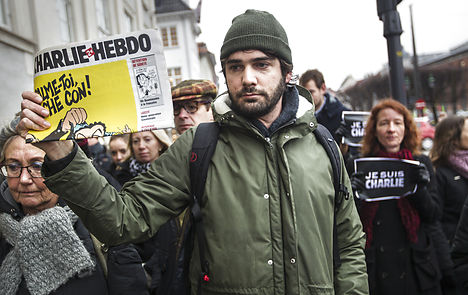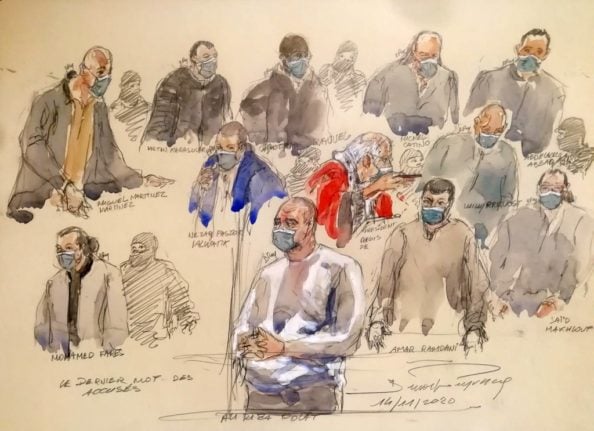CHARLIE HEBDO
Charlie Hebdo coming to Denmark
300 copies of the magazine's 'survivor's edition', which features a new caricature of the prophet Muhammad will be released in Denmark.
Published: 13 January 2015 14:42 CET

People in Copenhagen hold a vigil in support of Charlie Hebdo on January 8th. The magazine's 'survivor edition' will hit Danish shelves this week. Photo: Niels Ahlmann Olesen/Scanpix
A limited run of 300 copies of the first edition of French satirical weekly Charlie Hebdo since its staff were murderously attacked by Islamist gunmen last week will be released in Denmark.
Magazine distribution company Bladkompagniet has confirmed that the new edition, which shows a cartoon of the Prophet Muhammad crying and holding up a "Je suis Charlie" sign under the words: "All is forgiven", will be available on Danish shelves.
"We have ordered 300 copies, which we expect will hit magazine stores in Denmark either during the day Thursday or Friday morning at the latest," Bladkompagniet's CEO Christian Lanng told Berlingske.
Langg said that if the 300 copies are all sold, the company would order more to meet demand.
The front page of this week's Charlie Hebdo was released to media ahead of the magazine's publication on Wednesday, which The Local has decided not to reprint. Three million copies of the special "survivors' edition" are being printed and will be made available in 25 countries, translated into 16 languages because of international demand.
Worldwide sympathy and "Je Suis Charlie" solidarity rose up around Charlie Hebdo in the wake of the attack against it last Wednesday, in which 12 people were killed including five of its top cartoonists.
But the magazine's fresh caricature of Muhammad could renew fury by some extremely devout Muslims who believe it is forbidden to depict their prophet in any way.
The two gunmen who attacked Charlie Hebdo's offices in Paris last Wednesday said as they left the scene that they had "avenged the Prophet Muhammad".
The staff first started receiving death threats in 2006 when they republished cartoons by Danish newspaper Jyllands-Posten that had triggered violent riots in some Muslim countries.
The offices of the weekly were firebombed by suspected Islamists in 2011 when it published other cartoons making fun of Muhammad, causing no injuries.
The surviving employees of Charlie Hebdo have sworn to uphold its tradition of lampooning all religions, politicians, celebrities and news events. Islamic extremists have often been ridiculed in its pages through provocative and irreverent cartoons.
We will "cede nothing" to extremists seeking to silence them, the publication's lawyer, Richard Malka, told French radio on Monday.
"In each edition for the past 22 years there has not been one where there have not been caricatures of the pope, Jesus, priests, rabbis, imams ou Mohammed," he said.
It would have been "surprising" if a Mohammed cartoon did not feature in the new issue, he said.
He stressed that Charlie Hebdo saw itself as "not a violent newspaper but an irreverent one".
To limit the overwhelming burden on our moderators, it will not be possible to comment on this article. Feel free to join the conversation on our Facebook page.
Url copied to clipboard!


 Please whitelist us to continue reading.
Please whitelist us to continue reading.